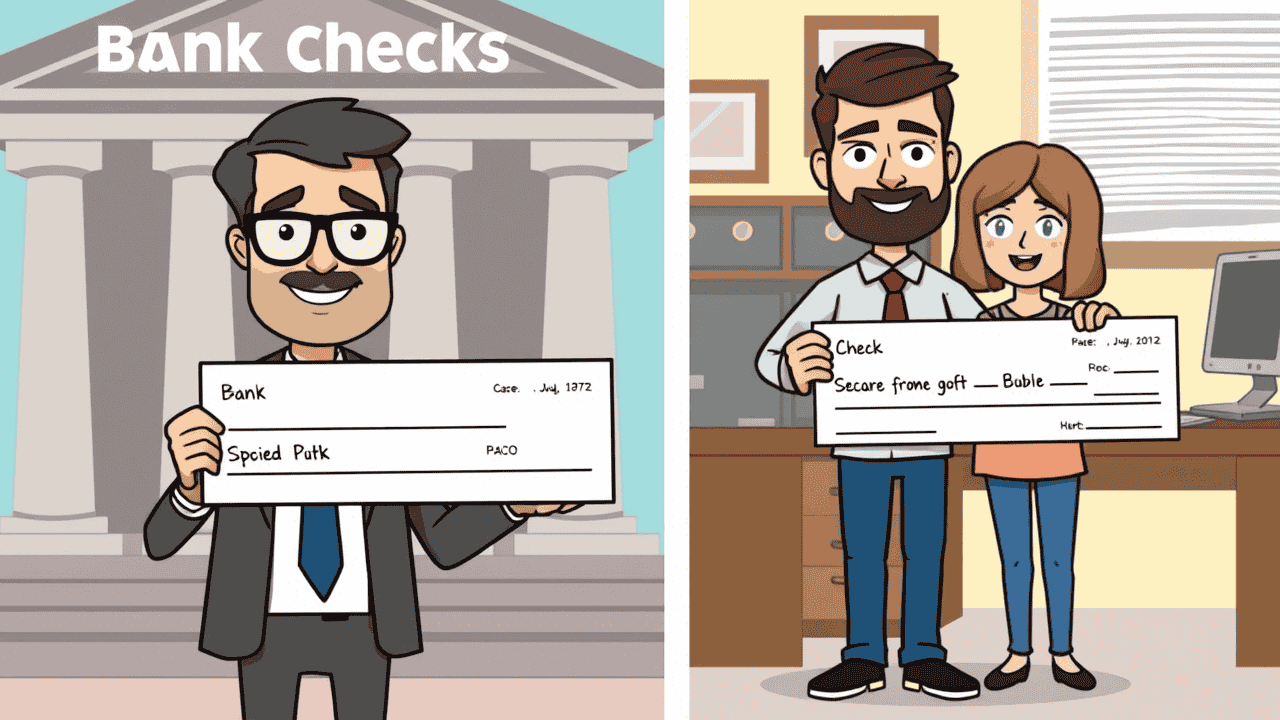In today's digital world, paper checks might seem like financial relics, yet they remain essential tools in many banking transactions. Understanding the distinction between bank checks and personal checks can save you time, money, and potential headaches at critical financial moments. Whether you're making a large purchase, sending money to a family member, or handling business transactions, knowing which check to use can make all the difference. This comprehensive guide breaks down the key differences between these two payment methods, helping you navigate the sometimes confusing world of paper-based payments with confidence.
What Exactly Are Bank Checks and Personal Checks?
Before diving into the differences, let's clarify what these financial instruments actually are.
Personal checks are payment orders drawn against funds you've deposited in your checking account. When you write a personal check, you're instructing your bank to transfer money from your account to the recipient named on the check.
Bank checks (also known as cashier's checks, official checks, or bank drafts) are guaranteed payment instruments issued directly by financial institutions. Unlike personal checks, the bank itself guarantees the payment, as the funds are withdrawn from your account at the time the check is purchased.
7 Critical Differences Between Bank Checks and Personal Checks
1. Source of Funds and Guarantee
Personal checks rely entirely on the account holder's funds and reputation. There's no guarantee that sufficient funds exist when the check is cashed.
Bank checks, however, are pre-funded and guaranteed by the financial institution itself. The bank withdraws money from your account immediately when issuing the check, making it as reliable as cash.
"Bank checks essentially convert your personal funds into the bank's promise to pay," explains banking expert Sarah Chen. "This is why they're often required for high-stakes transactions."
2. Cost Differences
Personal checks typically cost only what you pay for your checkbook – usually between $10-$25 for a box of 100-200 checks.
Bank checks come with a fee every time you need one. Most banks charge between $10-$15 per bank check, regardless of the amount.
3. Security Features
Bank checks include sophisticated security features like watermarks, security threads, and special papers that make them extremely difficult to forge or alter.
Personal checks generally have fewer security features, though many now include basic protections like microprinting and chemical-sensitive paper.
4. Acceptance and Trust Factor
Because they're guaranteed by financial institutions, bank checks are widely accepted for major transactions like real estate closings, vehicle purchases, and security deposits.
Personal checks might be rejected for large purchases or by businesses that have experienced check fraud in the past.
5. Processing and Clearing Time
Bank checks typically clear faster—often within one business day—since the funds are already set aside.
Personal checks may take 2-5 business days to clear completely, sometimes longer for larger amounts or out-of-state banks.
6. Stop Payment Capabilities
With personal checks, you can request a stop payment if the check is lost or stolen (for a fee, typically $25-$35).
Bank checks are much more difficult and time-consuming to cancel. Many banks require a 90-day waiting period before reissuing funds from a lost bank check, and the cancellation process often involves paperwork and additional fees.
7. Accessibility and Convenience
Personal checks are readily available anytime as long as you have your checkbook.
For bank checks, you must visit a bank branch in person (or sometimes through online banking with physical delivery) and pay the fee each time you need one.
When to Use Each Type of Check
Best Uses for Bank Checks:
- Large purchases (vehicles, real estate down payments)
- Situations where payment guarantee is required
- When the recipient doesn't accept personal checks
- Sending significant funds to someone who needs immediate access
- Security deposits for apartments or rentals
Best Uses for Personal Checks:
- Regular bill payments
- Smaller transactions
- Recurring payments
- Situations where you have an established relationship with the recipient
- When timing is flexible and immediate funds aren't necessary
FAQs About Bank Checks vs. Personal Checks
Can bank checks bounce?
Technically, bank checks shouldn't bounce since they're pre-funded. However, in rare cases of fraud or bank errors, problems can occur. Generally, bank checks are considered as reliable as cash.
Are money orders the same as bank checks?
No. While both are prepaid, money orders typically have maximum limits (often $1,000) and can be purchased at more locations, including post offices and convenience stores. Bank checks can be written for much larger amounts and are considered more secure.
Do bank checks expire?
Bank checks don't typically have expiration dates, but banks may have policies about stale-dated checks (usually those older than 90 days or six months). After extended periods, some banks might treat uncashed bank checks as abandoned property.
Can I get a bank check without a bank account?
Generally, no. Most financial institutions require you to have an account with them to purchase a bank check, as they'll withdraw the funds directly from your account.
In Summary
While digital payment methods continue to grow in popularity, understanding the distinctions between bank checks and personal checks remains valuable knowledge for anyone managing their finances. Bank checks offer guaranteed payment and higher security but come with fees and less convenience. Personal checks provide flexibility and cost-effectiveness but lack the same level of guarantee.
The next time you're making an important payment or transaction, consider these differences carefully. For everyday expenses and routine bills, personal checks often suffice. But when certainty and immediate clearing are paramount—like when purchasing a car or putting a down payment on a house—a bank check provides peace of mind that's well worth the additional fee.
Smart financial management isn't just about how much money you have, but also about choosing the right tools to move and protect those funds. Whether you opt for the convenience of personal checks or the security of bank checks, making an informed choice ensures your money reaches its destination safely and efficiently.

